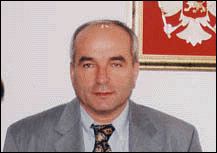 FROM STATE TO PRIVATE OWNERSHIP FROM STATE TO PRIVATE OWNERSHIP |
"We have completely liberalized exports and imports, brought customs services to the European Union standards, performed reforms of treasury and public expenditures, and entered the economic system with high degree of reforms. There is no turning back - we must go forward" proclaims Prime Minister Vujanovic.
A consultant for USAID even said that he had never seen a more dynamic development program, adding that the people in government are "true reformers".
In fact, the privatization program has gone into full force, and thanks to a Mass Voucher Privatization (MVP) program last year, Montenegrin citizens became owners in 220 medium sized companies.
Yugoslavia's unique system of social ownership - under which everybody effectively owned everything and nothing in the same time - has made privatization in the FRY a more complex and difficult affair than in other economies in transition.
The Montenegrin solution was to transfer majority ownership to three state-managed funds, with employees retaining a minority holding. 10% of an enterprise's shares were allocated to the workers, who had the right to purchase an additional 30% at a discounted rate (usually between 15 and 20% of the full price). The remaining 60% was split between three state-managed funds. The Development Fund received 36%, the Pension Fund 18% and the Unemployment Fund 6%. The funds were required to sell their entire stake within five years from the restructuring process, with a minimum 20% sold each year. By mid-1996, this first phase having begun in 1991, was almost completed with 96% of enterprises transferred from social ownership to the funds and employees.

"Through mass voucher privatization we were able to change the owners and the structure of these companies" says Branko Vujovic, Director of the Agency for Reconstruction and Foreign Investments.
The process was competitive, and for the first time Montenegrins participated in a national campaign to de-nationalize the economy. "It is truly a time of opportunity for Montenegro" says Barbara Sandic, Director of Infinity Montenegro, a young and innovative marketing company that ran a major media campaign for 'Atlas Mont', one of the privatization funds. "The MVP process was a successful process which will definitely energize the economy" predicts Sandic. | In fact, MVP will allow new management to form and encourage more capital allocation, which should allow these companies to improve their financial situation.
"We will increase the quality as much as possible" projects Slavko Drljevic, General Manager of Hipotekarna Banka, when talking about the investments of his privatization fund through auctions of state-owned companies.
On the meantime, the government has already achieved concrete results in its tender privatization programme: three major companies were sold through an open tender process, including the sale of Niksicko Pivo Breweries to Belgian Interbrew. With new management and a developed consumer market, Interbrew succeeded to improve quality of the beer, developed some new types of products, and restructured labour costs while boosting profitability.
Concerning the biggest companies that are going to be sold at a majority of shares (more than 50%), Vujovic said that "the price is not the main issue for us - we want to find solid, reliable owners for these important companies". They will be sold on international tenders with the assistance of foreign financial and legal advisors.
This year, Montenegro expects to privatize more than 90% of its economy and hopes to attract strategic partners for the privatization of major state corporations such as Telekom Montenegro, Elektroprivreda (the national electrical power company), KAP (the national aluminium corporation), Jugopetrol (the national oil processing and distribution company) and the Port of Bar.
Other major foreign companies are already heavily investing in Montenegro, such as Telenor from Norway, Siemens from Germany, Ramco from England as well as Ericsson from Sweden. The Montenegrin government has also been establishing a foreign investment law that provides foreign investors with the same rights as a Montenegrin investor, with no limits on investments.
"The foreign investment law is very stimulating and ensures very profitable investment conditions" says Prime Minister Vujanovic. "We are pleased that the experience of foreign investors has been very good, and I believe that the stability in this region will provide more investments this year".
Although time will tell if investments truly increase in 2002, one thing is clear: Montenegro is now open for business. |

